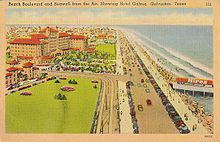The Free State of Galveston (sometimes referred to as the Republic of Galveston Island) was a satirical name given to the coastal city of Galveston in the U.S. state of Texas during the early-to-mid-20th century. Today, the term is sometimes used to describe the culture and history of that era.
During the Roaring Twenties, Galveston Island emerged as a popular resort town, attracting celebrities from around the country. Gambling, illegal liquor, and other vice-oriented businesses were a major part of tourism. The "Free State" moniker embodied a belief held by many locals that Galveston was beyond what they perceived were repressive mores and laws of Texas and the United States. Two major figures of the era were the businessmen, power brokers and crime bosses Sam and Rosario Maceo, who ran the chief casinos and clubs on the island and were heavily involved in local politics and the tourism industry. The success of vice on the island, despite being illegal, was enabled by lax attitudes in society and in government, both on the island and in the county. In one of the more famous examples of this, a state committee, investigating gambling at the fabled Balinese Room, was told by the local sheriff that he had not raided the establishment because it was a "private club" and because he was not a "member". (Full article...)
